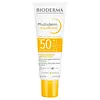What's inside
What's inside
 Key Ingredients
Key Ingredients

 Benefits
Benefits

 Concerns
Concerns

 Ingredients Side-by-side
Ingredients Side-by-side

Water
Skin ConditioningDibutyl Adipate
EmollientDiethylhexyl Butamido Triazone
UV AbsorberDiethylamino Hydroxybenzoyl Hexyl Benzoate
UV FilterDicaprylyl Carbonate
EmollientDiisopropyl Sebacate
EmollientBis-Ethylhexyloxyphenol Methoxyphenyl Triazine
Skin ConditioningCorn Starch Modified
AbsorbentGlycerin
HumectantPolyglyceryl-6 Stearate
Emollient1,2-Hexanediol
Skin ConditioningMicrocrystalline Cellulose
AbsorbentC20-22 Alkyl Phosphate
EmulsifyingC20-22 Alcohols
Emulsion StabilisingCaprylyl Glycol
EmollientPolyglyceryl-6 Behenate
Emulsion StabilisingCellulose Gum
Emulsion StabilisingEctoin
Skin ConditioningMannitol
HumectantXylitol
HumectantO-Cymen-5-Ol
AntimicrobialXanthan Gum
EmulsifyingRhamnose
HumectantSodium Hydroxide
BufferingButyl Methoxydibenzoylmethane
UV AbsorberTocopherol
AntioxidantPropylheptyl Caprylate
EmollientWater, Dibutyl Adipate, Diethylhexyl Butamido Triazone, Diethylamino Hydroxybenzoyl Hexyl Benzoate, Dicaprylyl Carbonate, Diisopropyl Sebacate, Bis-Ethylhexyloxyphenol Methoxyphenyl Triazine, Corn Starch Modified, Glycerin, Polyglyceryl-6 Stearate, 1,2-Hexanediol, Microcrystalline Cellulose, C20-22 Alkyl Phosphate, C20-22 Alcohols, Caprylyl Glycol, Polyglyceryl-6 Behenate, Cellulose Gum, Ectoin, Mannitol, Xylitol, O-Cymen-5-Ol, Xanthan Gum, Rhamnose, Sodium Hydroxide, Butyl Methoxydibenzoylmethane, Tocopherol, Propylheptyl Caprylate
Water
Skin ConditioningIsononyl Isononanoate
EmollientEthylhexyl Methoxycinnamate
UV AbsorberCyclopentasiloxane
EmollientDiethylamino Hydroxybenzoyl Hexyl Benzoate
UV FilterBis-Ethylhexyloxyphenol Methoxyphenyl Triazine
Skin ConditioningSilica Dimethyl Silylate
EmollientZinc Oxide
Cosmetic ColorantMethyl Methacrylate Crosspolymer-2
Dimethicone
EmollientPolymethylsilsesquioxane
Potassium Cetyl Phosphate
EmulsifyingCaprylic/Capric Triglyceride
MaskingDimethicone/Vinyl Dimethicone Crosspolymer
Skin ConditioningPhenoxyethanol
PreservativeSodium Chloride
MaskingScenedesmus Rubescens Extract
Skin ConditioningNiacinamide
SmoothingSodium Hyaluronate
HumectantTocopheryl Acetate
AntioxidantBisabolol
MaskingPentylene Glycol
Skin ConditioningSolanum Virginianum Extract
Skin ConditioningCitric Acid
BufferingEthylhexylglycerin
Skin ConditioningWater, Isononyl Isononanoate, Ethylhexyl Methoxycinnamate, Cyclopentasiloxane, Diethylamino Hydroxybenzoyl Hexyl Benzoate, Bis-Ethylhexyloxyphenol Methoxyphenyl Triazine, Silica Dimethyl Silylate, Zinc Oxide, Methyl Methacrylate Crosspolymer-2, Dimethicone, Polymethylsilsesquioxane, Potassium Cetyl Phosphate, Caprylic/Capric Triglyceride, Dimethicone/Vinyl Dimethicone Crosspolymer, Phenoxyethanol, Sodium Chloride, Scenedesmus Rubescens Extract, Niacinamide, Sodium Hyaluronate, Tocopheryl Acetate, Bisabolol, Pentylene Glycol, Solanum Virginianum Extract, Citric Acid, Ethylhexylglycerin
 Reviews
Reviews

Ingredients Explained
These ingredients are found in both products.
Ingredients higher up in an ingredient list are typically present in a larger amount.
You might know this ingredient as Tinosorb S or Bemotrizinol. It is a UV filter that covers both UVA and UVB rays.
This ingredient has two peak UV absorption peaks ( 310 and 340 nm) and is able to absorb both UV-A and UV-B rays. This ingredient works by preventing UV rays from reaching and damaging your skin.
On top of that - it is highly photostable and helps prevent the photodegration of other sunscreen ingredients such as avobenzone.
Tinosorb S is allowed in the EU, Australia, and Asia. It is close to being approved by the FDA and we'll hopefully get this ingredient in the U.S. by late 2025.
Fun fact: Tinosorb S is the most effective UV absorber at maximum concentration (measured by SPF) permitted in the EU.
This ingredient is oil-soluble, so your oil-cleansers will take this right off at night.
Learn more about Bis-Ethylhexyloxyphenol Methoxyphenyl TriazineDiethylamino Hydroxybenzoyl Hexyl Benzoate (DHHB) is a chemical UV-A absorber. It is formulated for high UVA protection (320-400 nm).
DHHB is well-liked for:
DHHB has been approved by the EU, Japan, Taiwan, and South America for use up to 10%. Unfortunately, it has not been approved for use in the US or Canada due to slow regulatory processes.
This ingredient is soluble in oils, fats, and lipids.
Learn more about Diethylamino Hydroxybenzoyl Hexyl BenzoateWater. It's the most common cosmetic ingredient of all. You'll usually see it at the top of ingredient lists, meaning that it makes up the largest part of the product.
So why is it so popular? Water most often acts as a solvent - this means that it helps dissolve other ingredients into the formulation.
You'll also recognize water as that liquid we all need to stay alive. If you see this, drink a glass of water. Stay hydrated!
Learn more about Water